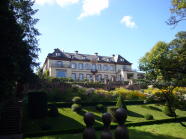General Outline of “Knowledge for Governance”
Development challenges of modern societies cannot be solved with hierarchical top-down regulation (state) or open systems of property exchange (market) exclusively. Neither the state nor the firm is able to provide solutions for the demanding dilemmas of collective action, as for example, the exhaustive exploitation and appropriation of natural resources, the settlement of allegedly incongruent interests of different stakeholders at local, regional and global levels, the collective creation and use of knowledge or the detrimental social disruptions that often follow events of natural catastrophes in vulnerable environments.
Mixed forms of governance and collective self-regulation are expected to complement the modes of governance being traditionally exerted by the nation state and corporations. Governance aims at elaborating solutions to collective problems of coordination, to the settling of conflicting interests, and to the creation of societal welfare. Knowledge is seen as the central asset that stakeholders contribute in governance processes. Governance for inclusive innovation and development is challenging due to dynamic and contextual interferences. Governance knowledge, for example, is neither distributed uniformly amongst the stakeholders of society nor is it similarly accessible at any time place. Knowledge is sticky in space and often consolidated in different scientific domains. In turn, one and the same knowledge is going to be valued differently in varied spatio-temporal contexts. The acts of valuing, mobilizing and directing knowledge for innovation and development are not performed autonomously by individuals; rather do they represent collective acts of negotiation and contextual adjustment. Hence, governance will have to be organized and coordinated differently in each specific context.
The 15th symposium of Knowledge & Space seeks to facilitate an interdisciplinary dialogue between experts from different fields in the social sciences, taking into account the varied understandings of governance and knowledge and the diverse roles that knowledge plays in processes of governance. On the one hand, the symposium addresses current research challenges related to the organization of governance processes. On the other hand, it invites contributions around the recurring questions of how exactly localized knowledge and/or domain specific knowledge do matter for governance:
- How can governance overcome the social dilemmas of collective action?
- What are the challenges for the governance of the creation, sharing and use of knowledge?
- How can we account for regional variations of governance and their outcomes?
- Can we qualify “effective” and “efficient” governance by focusing on the knowledge management in governance?
- What are the interdependencies between governance at local and regional scale with the nation state and its regulations?
- How does learning and localized knowledge affect the evolution of governance models?
- What can we learn from localized case studies on the governance of knowledge, innovation as well as natural and societal risks for the abstraction of governance models and the contextual adaptation of concrete governance solutions in context?





